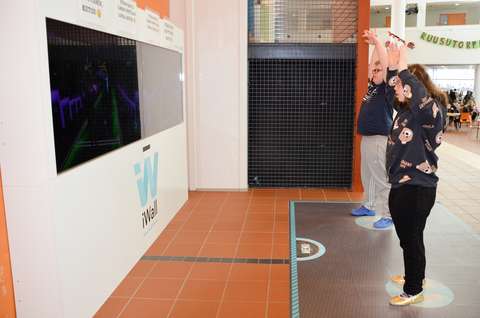Exercise games motivate children and develop motor skills: “A nice reward”
Pupils and staff of Ruusutorppa School have good experiences of an exercise gaming (exergaming) wall. Games motivate children to exercise in diverse ways and are accessible to all. At the same time, children learn to wait for their turn. When they gather around the game to encourage each other, the school’s community also improves.
The iWall exercise gaming (exergaming) wall is in the lobby of Ruusutorppa School. The wall-mounted game has two screens with round spots for the players on the floor in front of them.
Third-graders Samuel and Elias launch a football game. Jaakko and Lenny are waiting for their turn. The screen shows the ball approaching the goal. The children jump to save the goal and then kick the ball back to the field. The boys celebrate loudly once they see their score on the screen.
The games allow players to either compete against each other or collect points together.
“My favourites are games like parkour or skiing, where you race to the finish line as fast as you can,” says Jaakko, 9.
In addition to those games, he also likes games where players work together to achieve the best possible score.
Exercise games help develop diverse motor skills
The children in the special needs class also give a thumbs up to the exercise games. Their favourites include games about dancing, kayaking and ski jumping.
The exercise games are accessible, which makes them very suitable for special groups as well. The teachers of the special needs classes in Ruusutorppa School use iWall with their pupils weekly.
The exercise games are also a nice reward: first, pupils do their schoolwork in class and then get to play at iWall.
The games inspire pupils to move in different ways than in physical education classes. For example, the goal of a dance game is to copy the pose of the human figure on the screen as quickly as possible and collect points. The children develop their motor skills while having fun playing.
In addition to motor skills, exercise games also support social skills and contribute to community spirit.
When a class is playing, others often gather around to cheer for them. The gaming sessions are also excellent opportunities for children to wait for their own turn and take others into consideration. All games are for two players, thanks to which they also teach cooperation skills.
45,000 sessions and 1,000 hours of games played in a year
The iWall game wall has been in Ruusutorppa School for a year. So far, there have been 45,000 game sessions and 1,000 hours played.
“It is wonderful that Ruusutorppa School has used the game at this rate. The games have really got the children moving,” says Kimmo Leinonen, Project Manager for Digital Exercise and Sports at the City of Espoo.
